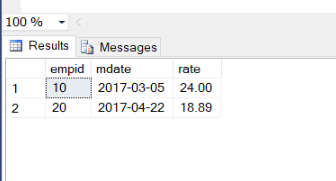Hi all, I greatly need your help with something.
Let's say I have data like the following.
empid classify date rate
10 6136 1/1/2017 20.22
10 6136 3/5/2017 22.45
10 LONG 2/22/2016 1.23
10 LONG 3/5/2017 1.55
20 1241 2/5/2016 10.50
20 1241 4/22/2017 15.64
20 LONG 12/22/2016 2.33
20 LONG 4/22/2017 3.25
I would like a query which would produce a distinct listing of empid's which sums up the most recent rates, according to the eff_date, for their two classifications of 'LONG' and whatever the other value may be.
The desired result:
EMPID EFF_DATE RATE
10 3/5/2017 24
20 4/22/2017 18.89
Thanks so much for your help.
